September 20, 2015 / mascara / 0 Comments
Alex Skovron is the author of six collections of poetry and a prose novella. The many public readings he has given include appearances in China, Serbia, India and Ireland, as well as Norfolk Island. A bilingual selection of his poetry translated into French was published in 2013 under the title The Attic, a volume of Chinese translations is underway, and his novella The Poet has been translated into Czech. His most recent book is Towards the Equator: New & Selected Poems (2014), and a collection of his short stories is forthcoming from Puncher & Wattmann.
Diminished Light
The little girl in the laundromat
is sitting so still
she could be a mirage. What
is she thinking, watching a sky crawl
with purple? Soon its shell
will crack, and rolled umbrellas
under everybody’s arm will billow
into their mushroom shapes,
and her mother watching the porthole
where a world spins will take
her by the arm, and soon she’ll fall
into her usual
late-afternoon haze as they cross
the glistened street, no less
and no more distant than before,
the wind clouding her face
the way the shopfronts suddenly share
diminished light, the way no voice
could say her sadness,
make real the little girl
hopping alongside, hungry bird.
September 20, 2015 / mascara / 0 Comments
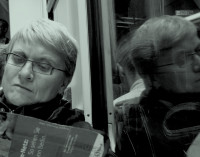 Jill Jones’ book, The Beautiful Anxiety, won the 2015 Victorian Premier’s Literary Award for Poetry. A new book, Breaking the Days, is due from Whitmore Press in late 2015. She is a member of the J.M. Coetzee Centre for Creative Practice, University of Adelaide. Her poems have been translated into Chinese, Dutch, French, Italian, Czech and Spanish. For five months in 2014-15, she was poet-in-residence at Stockholm University.
Jill Jones’ book, The Beautiful Anxiety, won the 2015 Victorian Premier’s Literary Award for Poetry. A new book, Breaking the Days, is due from Whitmore Press in late 2015. She is a member of the J.M. Coetzee Centre for Creative Practice, University of Adelaide. Her poems have been translated into Chinese, Dutch, French, Italian, Czech and Spanish. For five months in 2014-15, she was poet-in-residence at Stockholm University.
Bright Yellow Black
The papers are burning.
There are several dialects.
The wind rises with helicopters.
People below accept that now.
How, without precision
things fall apart in the dry.
The black box tells nothing
nor do autopsies.
The recounts tell nothing, again.
There’s shark blood on the shore.
Someone is recycling videos and tears.
Soon there won’t be enough.
Soon there’ll be more replicas.
On bright yellow farms the grain is ticking.
Clouds drop seeds.
People accept that now.
The black box tells nothing.
September 20, 2015 / mascara / 0 Comments
 Omar J Sakr is an Arab Australian poet whose work has appeared in Meanjin, Overland, Cordite Poetry Review, and Tincture Journal, among others. His poems have been translated and published in Arab, and he has been shortlisted for the Judith Wright Poetry Prize as well as the ACU Poetry Prize.
Omar J Sakr is an Arab Australian poet whose work has appeared in Meanjin, Overland, Cordite Poetry Review, and Tincture Journal, among others. His poems have been translated and published in Arab, and he has been shortlisted for the Judith Wright Poetry Prize as well as the ACU Poetry Prize.
Dear Mama
Don’t preach to me, mama, don’t tell me stories
about some holy book or other, about angels, demons and jinn –
I’ve already learned too well the religion of your fists.
My body has drummed its song, the gospel choir of bruises
so often it knows no other, and at night I still mumble
the chorus: sharp gasps interspersed with bass, with low moans.
Your god is capricious, strikes without reason – some days
(the days you had gear, I later knew) you’d smile and order us pizza
and we’d sit in the smoky temple of the lounge while your silver screen
apostles entertained us, spat & bled & fucked & loved & died
for us. Those days were best. Others were Nails-On-Chalkboard,
a kind of screaming at the edge of hearing – your cheekbones, jaw,
elbow, everything was knife sharp and cut against the air
even though your teeth were set, lips locked prison-tight.
Like tinnitus, I knew only I could hear it but I swear
your body screeched in warning those mornings, and we learned
to read your augurs in cigarette smoke, the signs prophesying pain
if we didn’t become paragons of stillness and silence. Later, you
told me you saw my treacherous father in me even as a boy,
that you hated the sight of my face, the reminder
that his sins were burned too clearly in my skin.
I remember the day the locksmith came, his confusion, then pity,
when he asked ‘you want the lock outside his door?’ He hesitated
but took your petty cash reward to seal my cage. If only
you knew how I made that cell my world, so expansive and free –
hundreds of books, each one a key. How could you think
walls would contain me? I ought to thank you, dear mama,
for the prayers I memorized, for the blessing of hunger, the urge
for independence you sang into my bones, percussion-deep,
and the need to travel, to roam across the lands and seas and discover
all that can be seen. I ought to thank you, dear mama, for your piousness,
for showing me the cruelty and beauty of God and godlessness
all at once, for teaching me that holiness is no more
than moments shared with those you love whether bonded by blood
or not. Especially not. I ought to thank you dear mama, but I can’t.
The mosque is empty, and I’m all outta prayers.
September 20, 2015 / mascara / 0 Comments
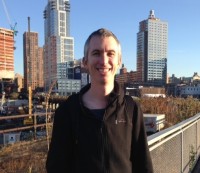 Damen is a Queensland poet, and has been writing for the last 20 years. He is currently working as a Contracts Manager for an Unmanned Aerial Vehicle company. Damen has been published in Cordite and The Courier Mail, and has won or been highly commended in the Yeats Poetry Prize, the Nillumbik Ekphrasis Poetry Award, Ipswich Poetry Festival, the Philip Bacon Ekphrasis Prize, and the FAW Tasmania Poetry Prize.
Damen is a Queensland poet, and has been writing for the last 20 years. He is currently working as a Contracts Manager for an Unmanned Aerial Vehicle company. Damen has been published in Cordite and The Courier Mail, and has won or been highly commended in the Yeats Poetry Prize, the Nillumbik Ekphrasis Poetry Award, Ipswich Poetry Festival, the Philip Bacon Ekphrasis Prize, and the FAW Tasmania Poetry Prize.
What Poem Would The Mining Companies Tell Lionel Fogarty?
In between howls that could be poems,
Lionel tells us that he is teaching the black kids poetry.
To a bunch of white middle class mainstreamers,
he’s reciting poems in monochrome bullets
about hate, and guilt and history, and we don’t miss the irony.
In between the dressing-down that could be poems,
he asks us what will the mining companies teach
his black kids about themselves? Every other word
is the whip, and the blessing: black. Black, black, black
is the poem Lionel Fogarty tells the mining companies,
and the mining companies who know about holes in the ground
echo it back to him. Black, black, black.
September 20, 2015 / mascara / 0 Comments
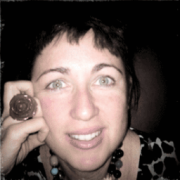 Natalie Rose Dyer is currently completing her PhD in Creative Writing at Melbourne University with an Australian Postgraduate Award. She received a BA with first class Honours in Cinema (2006) and an MCA (2010) from The University of Melbourne. She is currently working on her first book of poetry. The title poem ‘The Butcher’s Daughter’ appeared in 3/2014 Meanjin Literary Journal. Her work is also published in 2014 University of Canberra Vice Chancellor’s International Poetry Prize Anthology. Her first solo art exhibition was at Bokeh Gallery in Daylesford (2014). Her blog can be viewed at www.natalierosedyer.com
Natalie Rose Dyer is currently completing her PhD in Creative Writing at Melbourne University with an Australian Postgraduate Award. She received a BA with first class Honours in Cinema (2006) and an MCA (2010) from The University of Melbourne. She is currently working on her first book of poetry. The title poem ‘The Butcher’s Daughter’ appeared in 3/2014 Meanjin Literary Journal. Her work is also published in 2014 University of Canberra Vice Chancellor’s International Poetry Prize Anthology. Her first solo art exhibition was at Bokeh Gallery in Daylesford (2014). Her blog can be viewed at www.natalierosedyer.com
Haired
My bestial presence ever-present,
first noticed at primary school.
The other girls had unhaired legs,
mine outpoured like a simian species.
I wanted to run right out of the playground,
but was stuck there in my body
with awareness of myself half-manned.
Not just on my legs, later I discovered
black-weeded death above my lip,
the barnacled beard of stray hairs came later,
shower of dusty dark wired pubic tendrils
in my armpits, though not as thick as
the German girls witnessed in the change room,
shamed her for not shaving it off
to my friends later. But she was just like me,
covered in latticed thread to her mid-thigh,
hiding the underling, centre of blood
unmasked, which we all waited on expectantly.
There was even more hair knitted,
a furry rainbow that arched over my eyes,
fighting for my life against the insults
until I waxed it off, even then –
naked of hair, I hid behind my wintry coat,
an Athenic shield made invisible,
preparing to fight, sharpening, having
torn from myself the bushy blessing
through wanting to fit in, but never quite able
to take it all off, my furry blood
at the hinge of my sex, a creature stirring.
September 20, 2015 / mascara / 0 Comments
 Hessom is an Iranian-born doctor who grew up in Pakistan and the UK before moving to Australia. His itinerant life colours his interest in culture, human rights and awesome Middle Eastern food. He is grateful to his Mum, siblings and partner Megan for keeping him in line.
Hessom is an Iranian-born doctor who grew up in Pakistan and the UK before moving to Australia. His itinerant life colours his interest in culture, human rights and awesome Middle Eastern food. He is grateful to his Mum, siblings and partner Megan for keeping him in line.
Kandy dream
Hot quadrangle lined with
neon-yellow bananas,
sunrise papayas, king coconuts;
the din of cleavers,
steaming mutton,
rubble of intestines and
red-eyed crows;
Station Road, Kandy.
‘Halō! Āyubōvan! A salaam aleykum!’
Clamour and pang of
new markets, stall-faces of
cardamom eyes, Aryuvedic oil nostrils,
tea leaf lips: white, cinnamon,
vanilla shoots, taking root after
the weeding.
Tea for Katherine, tea for Mum,
ethnic, clean, gift-shopper’s dream.
News clipping on the tea-shelf
slips, grainy image of a Tamil man.
Naked in handcuffs, blindfold-tie trailing
as he tips into a marsh,
Kalashnikov singing his lullaby.
Hurriedly shuffled away, back to
talk of tea and Kandy.
September 20, 2015 / mascara / 0 Comments
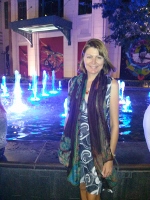 Rose Hunter is the author of three books of poetry: You As Poetry (Texture Press, Oklahoma), [four paths] (Texture Press), and the river (Artistically Declined Press, Oregon). A chapbook of her poems is forthcoming from Dancing Girl Press (Chicago), and she will appear in the anthology Bend River Mountain (Regime Books, Perth). She has been or will soon be published in such journals as Cordite, Australian Poetry Journal, Regime, Geist, New World Writing, DIAGRAM, PANK, The Nervous Breakdown, Verity La, and The Los Angeles Review. She is from Brisbane, spent many years in North America, and is now in Puerto Vallarta, Mexico. She also works as a freelance editor. More information about her is available at Whoever Brought Me Here Will Have To Take Me Home (http://rosehunterblog.wordpress.com).
Rose Hunter is the author of three books of poetry: You As Poetry (Texture Press, Oklahoma), [four paths] (Texture Press), and the river (Artistically Declined Press, Oregon). A chapbook of her poems is forthcoming from Dancing Girl Press (Chicago), and she will appear in the anthology Bend River Mountain (Regime Books, Perth). She has been or will soon be published in such journals as Cordite, Australian Poetry Journal, Regime, Geist, New World Writing, DIAGRAM, PANK, The Nervous Breakdown, Verity La, and The Los Angeles Review. She is from Brisbane, spent many years in North America, and is now in Puerto Vallarta, Mexico. She also works as a freelance editor. More information about her is available at Whoever Brought Me Here Will Have To Take Me Home (http://rosehunterblog.wordpress.com).
el edén
to strike or dash (esp.) sharp collision
to have an effect; to make an impression to have an effect
or impact (esp.) a negative one, to take a bit of negative out
of that, big shouldered, paredón; to advance, encroach
on an area belonging to (esp.
but you went over into the death world
with those others, so many from the white room, what is it
i asked, something like punishment; impinge also
in the sense of shoulder, never
the bolder the lime green the rarer the bougainvillea
the whiter the surface the dearer the to whomever it may concern
descanso: alonso lopes guardado; same day different year
his birth date and your death date. how
do they do it don’t they know you died here, nearby
bikini sweating on the rocks helicopter mistletoe
skeleton house, lazy dog and palomino
magic wand bridge one eyed fence canyon plunge, buggy
tiny flimsy that killed you
September 10, 2015 / mascara / 0 Comments
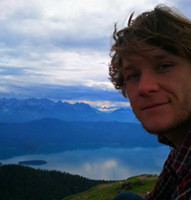 Jake Goetz lives in the southern suburbs of Sydney. He has also lived in Munich, Germany (2011) and Graz, Austria (2013) where he studied on exchange. His poetry has appeared in The Sun Herald, Rabbit, Voiceworks, Jaws (Austria), Tide and Otoliths. He completed a Creative Writing Degree at the University of Wollongong, receiving an Asiabound fellowship to Sun Yat-Sen University in China. He is a fiction editor for Mascara.
Jake Goetz lives in the southern suburbs of Sydney. He has also lived in Munich, Germany (2011) and Graz, Austria (2013) where he studied on exchange. His poetry has appeared in The Sun Herald, Rabbit, Voiceworks, Jaws (Austria), Tide and Otoliths. He completed a Creative Writing Degree at the University of Wollongong, receiving an Asiabound fellowship to Sun Yat-Sen University in China. He is a fiction editor for Mascara.
Rudimentary sketches
… still dreaming
of Russian Pacific seas
sprouting Swedish palms
and a Peruvian woman
with lorikeet eyes
translating nationalism
as breathing – the morning
like a border-less idea
wie in einem großen kreis angeordnet
aber mit anderen namen
*
wind carries the sound
of a train to my door
and i think of waves forming
only to fold like impatient arms
in the local medical centre
and how unnatural it is
to look at the self
in the mirror
*
tree stump sits on brick ledge
wet from rain, dew hangs
from iron fence, could be watery eyes
peering into the late-morning
but it’s mostly dew and a Cockatoo sounds
cigarette burns, feet rest upon pebbles
as shade separates the yard
and a plane moves like a container
of consciousness, banking left
over the Royal to tip out into the city
September 10, 2015 / mascara / 0 Comments
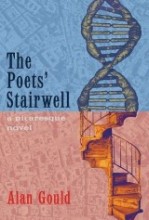 The Poets’ Stairwell
The Poets’ Stairwell
by Alan Gould
Black Pepper
ISBN: 9781876044800
Reviewed by GEOFF PAGE
First, a disclosure. I have known the poets Kevin Hart and Alan Gould, the “real life” protagonists of this autobiographical novel, for more than forty years. While this must inevitably intensify the pleasure I take in the work, it should not necessarily undermine my judgement that The Poets’ Stairwell is a first-rate creation which can travel well in any company. It is also something of a coup for its relatively small Melbourne publisher.
Among the work’s numerous merits is that it operates as several sorts of novel at the same time. It wears the term “picaresque” in its subtitle and there is no doubt that it comprises a journey with humorous episodes — a “road movie”, if you will. It is also, however, a novel of ideas, comparable to Thomas Mann’s The Magic Mountain in which each of the major characters cleverly embodies a way of thought popular in the nineteenth century. Given that it presents a comprehensive and searching portrayal of two very different temperaments, The Poets’ Stairwell can also be called a psychological novel. Gould’s talent is that he can keep these three potentially diverging ambitions in the air simultaneously without mishap.
At one level, the narrative of The Poets’ Stairwell is quite simple. Two young Australian poets, Claude Boon and Henry Luck (both of them London-born, as it happens) are on their backpacking “Grand Tour” of Europe in 1976. Henry, a few years Claude’s junior, is prodigiously well-read and sometimes unbearably sure of himself — intellectually at least, if not socially. Claude, or Boon, as he prefers to be called, is the novel’s narrator and perhaps something of its Sancho Panza (though Henry Luck is a little more worldly than Don Quixote).
Together, they make a low-budget tour of Europe which includes London, Ireland, Paris, Venice, Florence, Assisi, Rome, Istanbul, Athens, Vienna, Prague and Rotterdam in roughly that order. Henry is a good deal less adventurous about accommodation than Boon but, with a few crises, they manage to travel companionably throughout. While Boon, more than a little under the influence of Nietzsche, is becoming increasingly aware of his historical muse, Luck is, in effect, converting to Roman Catholicism.
As with all picaresque tales, a cast of diverting (and somewhat emblematic) characters is encountered. These include Luck’s long-distance London girlfriend, Rhee, and her friend, Eva, a talented dancer and fervent Marxist. Another character, Beamish, the anarchist, represents a more reckless and self-destructive alternative to the relatively sedate lives the poets envisage for their later selves. A few of these characters re-appear, somewhat coincidentally, at various points in the poets’ wanderings. Others pop up for one or two chapters only.
Paradoxically, Luck, the younger poet, seems to be the more mature intellectually and perhaps even morally, having a clear (if overly precise) idea of what he wants and what he doesn’t want from life. Boon is much more open to new experiences. Luck is inclined to close himself off from them, sometimes with disdain. He does, however, display some vulnerabilities and it is a sign of Boon’s developing maturity that he is able compassionately to take these into account.
Though there is much talk of “finding one’s muse” the adventures and aesthetic discussions along the way are of wider relevance than the novel’s subtitle may at first suggest. A sense of vocation, as opposed to a money-spinning “day-job”, is by no means a rare thing these days — though the vocation may take some years to emerge clearly (with perhaps one or two false starts along the way).
A recurrent thematic concern in this context is embodied in the Latin proverb “poeta nascitur non fit” (“a poet is born, not made”). Enough of Boon’s and Luck’s earlier lives is given to support the “made” half of the maxim while the temperaments displayed on their travels reveal a good deal about the “born” side. Clearly, as Gould makes plain, there are different muses and different sorts of poets. It is a sign of both young men’s growth that they come progressively to realise this about the other — even if that progress is not always evenly made.
Such realizations give rise to many of the more affecting moments in the novel. One is Boon’s early decision (suggested to him by a drunken, if aristocratic, Irishman) not to leave the somewhat annoying and inhibited Henry in the lurch and go off on his own. Another, much later in the novel, is where Luck, without even trying or fully realising what he is doing, contrives to set a female American plumber, Martha, on the way to a new life and career in philosophy and academia.
Boon’s account of her departure for the U.S. is also an example of the novel’s sharply focussed yet relaxed style:
‘This has been the best day of my life,’ she managed. ‘I’ll write you,’ and showed in her notebook where she had taken down Henry’s Brisbane address. Then the door closed with a pfffft, and she was gone.
‘She seemed moved,’ Henry looked puzzled.
‘She was moved’
‘I’ve no idea what I did,’ he looked genuinely helpless. ‘ I just rattled off what any book could tell her. Why was she so moved?’
By the book’s denouement, Gould fictionally varies what is publicly known of “Henry”’s (or Hart’s) subsequent career but the twists, at the psychological level, may be insightful even so. The rather anti-climactic update on the Boon-Luck friendship provided in the book’s last paragraph is sadly convincing. Boon writes to Rhee, who has stayed in London and remained in contact with Henry long past the end of their relationship, saying merely: “If you see him, wish him well.”
Henry and Boon’s “Grand Tour” has served its necessary and important developmental purpose. There is no need for a postscript updating us on the poets’ fortunes after they emerge from the “stairwell”. The novel is sharply focussed on key events in their parallel and interacting lives as young men. Anything more would be material for other, very different novels — one of which Gould has, in effect, already attempted in The Seaglass Spiral.
GEOFF PAGE is a Canberra-based poet and critic. He is editor of The Best Australian Poets, 2015.
September 9, 2015 / mascara / 0 Comments
 Prithvi Varatharajan is a PhD candidate at the University of Queensland, and a freelance producer of literature and arts programs for ABC Radio National. He is writing his PhD thesis on the radio program Poetica, which aired on ABC RN from 1997 to 2014. He has published scholarly, critical and creative writing in various Australian and overseas journals and books. His article on a Poetica adaptation of John Forbes’ poetry is forthcoming in a special issue of Adaptation titled ‘Adapting Australia
Prithvi Varatharajan is a PhD candidate at the University of Queensland, and a freelance producer of literature and arts programs for ABC Radio National. He is writing his PhD thesis on the radio program Poetica, which aired on ABC RN from 1997 to 2014. He has published scholarly, critical and creative writing in various Australian and overseas journals and books. His article on a Poetica adaptation of John Forbes’ poetry is forthcoming in a special issue of Adaptation titled ‘Adapting Australia
Ecstasy
the streets are wide open
leading you through a bleak
and beautiful future
rain slakes down,
slashing at the jacket
you hold dearly
by its sleeve, your chin
tucked in
we leg it over the bridge
to a dimly imagined
destination
lights of the park,
brilliant in their unreality
glisten as we pass
their globes hold pure warmth
that ebbs into the night
like a promise of happiness
Country. Car Window.
late afternoon’s
division of road,
its sleek black skin
pared open
by white
the white, a crumb-trail
to a near horizon
the white, the pulse
of something
nearly forgotten
above the road
a kookaburra
shabby in a tree
laughs deliriously
rogue hay bales
roll motionless
on a field
so vast the eye
blurs at its edges
and a fence of slouching steel
lengthens to a darkening
distance, linking
infinite horizons
with apparent ease.








